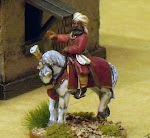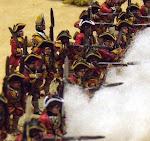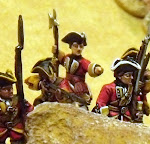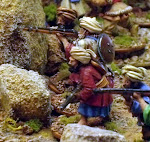Marcus and Titus are placed in the arena, separated by 5 hex spaces. Each of the players take a number of Arena Dice equal to double their gladiator’s Prowess scores and roll them. Marcus will be rolling 8 Arena Dice and Titus will be rolling 6. These rolls will determine the number and type of actions that will be available to each gladiator this turn.
Marcus rolls his 8 dice and scores: 1 Laurel, 2 Swords & Laurel, 2 Swords and 3 Foot. Fresh from his victory over Halitosis of Syria, the murmillo is in excellent form.
Titus rolls his 6 dice and scores: 1 Swords & Laurel, 2 Swords and 3 Foot. The unblooded thraex is off to a nice start as well.
The players allocate their rolled Arena Dice into the appropriate boxes on their play sheets to help organise the dice during play.
 |
| Marcus' Arena Dice |
 |
| Titus' Arena Dica |
For now the gladiators must determine which of them holds the advantage initially and to do this they must both make their first test. A test is performed by simply rolling a number of d6s equal to the appropriate attribute score and counting how many results of 4 or higher are scored. These are called successes.
To determine advantage, the gladiators are required to each make a Speed test. They both take a number of d6s equal to their Speed scores and roll them.
Marcus rolls 3d6, scoring results of 1, 4 and 5. Normally this would equate to 2 successes, but because he is burdened by his heavy scutum, Marcus only scores successes on Speed tests with rolls of 5 or higher. This results in him scoring only a single success.
Titus rolls 4d6, scoring results of 3, 3, 4 and 5. Unlike his opponent, Titus is not burdened by a heavy shield and so his roll results in him scoring 2 successes.
The number of Foot symbols in their dice pools are added to these successes. Both gladiators add 3 to their successes, resulting in Titus with 5 successes and Marcus with 4. Titus wins and holds the advantage.
Titus must now take an action, as all eyes are upon him. Not wishing to rush into combat too eagerly, he chooses the Step action. He spends a Foot die (although he may have chosen any symbol for this particular action) and discards it from his play sheet. He moves his Speed (4) in hexes, stepping cautiously towards his opponent. His action is now complete and because the action was not an attack, the advantage automatically passes to his opponent.
Marcus now holds the advantage and is eager to fight, but he is not engaged (in an adjacent hex) with his opponent yet. He does not wish to waste the advantage by moving only, so chooses the Step Attack action. This will allow him to both move up to his Speed and attack his opponent. It will come at the cost of a fatigue counter though, as both moving and attacking in the same action is taxing. He spends a Foot and a Sword die and places a fatigue counter in his fatigue box on his playsheet. He must be wary of becoming fatigued too early.
 |
| Marcus adds a fatigue counter. |
Marcus declares he is striking at Titus with his gladius and determines his attack dice pool. He adds together his Skill, weapon bonus and any Impetus bonuses to determine how many d6s he will be rolling in the attack. A weapon bonus is only gained if a gladiator is fighting with a longer weapon than his opponent. Both Marcus’ gladius and Titus’ sica are considered of equal length, so Marcus gains no weapon bonus. Likewise, at the moment he does not possess an Impetus bonus, a reward for holding the advantage continuously in an attack. Thus, Marcus’ attack dice pool consists purely of his Skill (3) score and so he will be rolling 3d6.
Titus must now declare a defence. Defending does not normally cost an Arena Die and a gladiator may always defend himself regardless of what Arena Dice he has left. Should a gladiator choose to perform one of the Defence actions although, he must spend the appropriate Arena Die to do so. Titus declares a standard defence and determines his defence dice pool. He will add his Skill (3) and either a weapon bonus or shield bonus, but never both. As detailed earlier, neither Titus nor Marcus has a weapon bonus, so the thraex must rely on his shield for defence (which is probably what it is designed for). His square parma has a shield bonus (SB) of 2 as listed on the weapon counter. Titus will be rolling 5d6 in defence.
Either gladiator now has the opportunity to spend a Laurel or a Skull. Spending a Laurel will increase their own dice pool by 1d6, while spending an opponent’s Skull will reduce the opponent’s dice pool by 1d6. Only Marcus has a Laurel, and at this stage in the bout declines to spend it.
Both gladiators roll their dice and compare the results. This is called an opposed test and requires the gladiator performing the action to roll more successes than his opponent. Marcus rolls a 1, 2 and 6; while Titus rolls a 2, 3, 3, 4 and 4. Titus rolls 1 more success than Marcus does, catching the blow easily on his shield.
Even though Titus has successfully parried the murmillo’s strike, the thraex is still forced into the hex space directly behind him. Marcus, as the attacker has the option to follow his opponent and occupy the hex that Titus has just vacated or remain where he is. This is called pushback and, Marcus, who intends to press his attack, decides to follow the thraex up.
As Marcus has just performed an attack action, he may now choose to press his attack, regardless of whether his blow struck. Pressing allows a gladiator who has just performed an attack action to retain the advantage and perform another attack action. Apart from the obvious benefit of making consecutive attacks, the pressing gladiator also gains Impetus – a bonus 1d6 that he adds to his next and any successive attacks.
Marcus initiates a press, which comes at a cost, and must spend either a Foot or a Swords & Laurel. If he spends a Foot to press, he must then choose an attack action and pay for it as normal. Should he spend a Swords & Laurel instead, he gains a Basic Attack action without spending any further Arena Dice.
Marcus elects to press with a Foot, discarding the die, and he places a d6 somewhere on his play sheet to remind him of his Impetus bonus. He declares his next attack action to be an Advanced Attack, spends a Swords & Laurel and chooses the Offhand Strike action. This action entails him to strike with his offhand weapon, the scutum, with the intentions of setting up a more powerful follow-up attack next action. He declares the Offhand Strike with his shield and determines his attack dice pool. The scutum has the same weapon length modifier as his gladius, so he adds no dice for weapon bonus, but he now possesses an Impetus bonus of 1d6. Adding this to his Skill (3), he will now attack with 4d6.
Titus decides to push his luck and performs a standard defence with his shield again. He determines his defence dice, which remain unchanged at 5d6. Before they roll the dice, Marcus declares that he will spend a Laurel to increase his attack dice by 1d6, taking his pool to 5d6, an even amount of dice as his opponent’s.
The gladiators both roll their dice and tally the results. Marcus rolls a 1, 2, 3, 4 and 6; while Titus rolls a 2, 2, 3, 3 and 5. Marcus’ attack succeeds by 1 success and he must now determine where the blow has struck his opponent.
Rolling 2d6 on the Hit Location table he scores a 6, resulting in a blow to Titus’ left leg. A quick look on the thraex’s armatura sheet shows that his left leg is armoured and will require rolls of 5 or more to damage him there. Marcus now determines if he has wounded his opponent, by adding his Strength (4) and the number of successes (1) he achieved in the attack and rolling the 5d6. He scores a 1, 1, 4, 6 and 6, resulting in 2 successes. The thraex has been wounded and Titus must place 2 wound counters onto the left leg area of his armatura sheet. He is capable of taking only 1 more wound to his left leg before suffering any detrimental effects. The crowd roars as Marcus adds a favour counter to his crowd favour box for wounding his opponent.
Titus must immediately determine if the wound is bleeding heavily enough to hamper him. He makes a Stamina (3) test against the amount of wounds (2) taken, and rolling his 3d6 scores a 3, 3 and 5. He only manages 1 success, when he needed 2, so unfortunately for the thraex, the wound is bleeding, but not as badly as it could be. Titus adds a single bleeding counter to his fatigue box, along with a favour counter to his crowd favour box. The crowd likes to see their gladiators bleed.
Lastly Titus must roll a number of dice equal to the number of wounds (2) he has just sustained. This is called a stumble roll and determines if something adverse happens as a result of the wound. He rolls 2d6 and neither of the dice comes up a 1, so he is safe.
 |
| Titus' bleeding wound to his left leg. |
Marcus declares his Basic Attack with his gladius and determines his attack dice. He adds his Skill (3) along with his Impetus (2) and Offhand Strike (1) bonuses together for a total of 6d6. The murmillo is confident he will strike his enemy again.
Titus looks a little nervous (and green). He knows that Marcus is capable of pressing again after this attack, as he still retains a Foot and Swords. Titus decides to use a Defence action and spends his only Swords & Laurel die to perform a Counter. If he succeeds in defence, Titus will deny the murmillo the opportunity to press and will gain the advantage and a chance to finally attack. It is a gamble although, which could see him loose an Action Die for no gain. Titus declares the Counter defence with his shield and determines his defence dice. They are the same as before and remain at 5d6.
The gladiators roll their dice and calculate their successes. Marcus rolls a 2, 3, 4, 5, 5 and 6; a great roll. Titus rolls a 2, 3, 3, 4 and 5. Unfortunately for the thraex, Marcus’ attack succeeds again, this time, with 2 successes. Marcus reaches for his dice to determine where he has struck his opponent, but Titus has another idea. He forces Marcus to use his Unlucky trait. Marcus discards the trait counter and must reroll his attack dice. This time the murmillo rolls a 1, 1, 2, 3, 5 and 6. He really is unlucky.
With this new roll Titus’ successes reduce Marcus’ successes to 0. The attack misses and Titus fulfils the Counter action by immediately gaining the advantage (he does not suffer pushback) and taking his own Basic Attack. Marcus must discard his 2d6 Impetus bonus, as they are only in effect while he holds the advantage consecutively.
Titus declares his attack with his sica and calculates his attack dice for the first time. He can add only his Skill (3) as he has no weapon or Impetus bonus, for a total of 3d6.
Marcus, steady behind his scutum, declares a standard defence with his shield and calculates his defence dice. He adds his Skill (3) and the shield bonus (SB 3) of his scutum, for a total of 6d6.
Both gladiators roll their dice and calculate their successes. Titus rolls a 4, 4 and 5; while Marcus rolls a 2, 2, 2, 4, 5 and 5. Marcus’ 3 successes reduce Titus’ own 3 to 0 successes, which would normally result in a miss, but Titus is a thraex and wields a sica sword. The sica uniquely allows a thraex to succeed in an attack that has been reduced to 0 successes. Titus’ curved sword nips around Marcus’ shield and catches the murmillo in the right leg (Titus rolls his 2d6 and scores a 10 on the Hit Location table). Marcus’ armatura sheet shows that his right leg is unarmoured, requiring only a 4+ to wound – a lucky shot indeed.
Titus must now determine if he has wounded Marcus, by adding his Strength (3) with the number of successes achieved in the attack. He of course scored 0 successes, so Titus is rolling just the 3d6. He rolls remarkably well and scores a 4, 6 and 6. A solid blow, the thraex is in fine form.
Marcus places 3 wound counters on the right leg area of his sheet and as the crowd erupts, Titus places a favour counter in his crowd favour box for wounding the murmillo.
Marcus must now determine if he is bleeding and takes a Stamina (4) test versus the amount of wounds (3) sustained. He rolls his 4d6 and scores a 1, 3, 3 and 5, managing only a single success and resulting in him adding 2 bleeding counters to his fatigue box. He does gain a favour counter for receiving the bleeding wound, but it is a small conciliation. Marcus finally makes a stumble roll with 3d6 and is lucky to avoid rolling any “1”s.
 |
| Marcus' bleeding wound to his right leg. |
Both gladiators roll their dice and calculate their successes. Titus rolls a 2, 3, 5 and 5; while Marcus rolls a 1, 2, 3, 3, 4, 6 and 6. Marcus succeeds in fending off a second blow from the thraex and his wicked sword, but just. It looks like the Evade action paid off.
Marcus moves back 1 hex from pushback (he could have chosen any of the rear 3 hexes to move into) and, Titus, who is capable of pressing one last time, follows him up. The thraex declares a press again, spending both his last Foot and last Swords to do so - he is out of Arena Dice now. He places a second Impetus die on his sheet and declares his Basic Attack action with his sica. Calculating his final attack dice as Skill (3) plus Impetus (2), giving him 5d6 total.
Marcus can do little but hunker down beneath his shield. He declares a standard defence with his scutum and determines his defence dice to be back to 6d6 again, Skill (3) plus shield bonus (SB 3).
Both gladiator roll their dice and calculate successes. Titus rolls a 1, 1, 4, 6 and 6; while Marcus rolls a 1, 3, 3, 4, 5 and 5. Another 0 success strike! Again the thraex’s sica finds a gap in Marcus’ defences.
Titus rolls 2d6 to determine hit location and rolling an 8, he strikes the murmillo’s left arm, which is covered by his large shield. Titus requires “6”s to wound Marcus there and rolling his Strength (3) he fails to roll a single wound. The scutum saves the murmillo’s arm from being cut by the sica. Marcus does not suffer a wound.
Titus forces his opponent back 1 hex again, but this time, knowing he is out of Arena Dice, elects to remain where he is. There is now a 1 hex space between the thraex and his opponent. Unable to press, Titus discards his Impetus dice.
Marcus gains the advantage, but he is left with a Swords only. Unable to perform an attack action as he is not engaged, he checks the list of actions and determines his only option is a Step or No action. Not wanting to close straight back into combat without knowing who will hold the advantage next turn, he declares a No action, spends his last Action Die and remains stationary in the hex. The thraex’s onslaught has left him a little taken aback. The crowd is not impressed with this lull in the entertainment and urges Marcus back into the fight. The murmillo gains a disfavour counter, reducing his favour back down to 2 (including his initial fame counter), for failing to close with his opponent during his action.
Neither gladiator has any Arena Dice left, but before the turn repeats itself, there is a bleeding and fatigue phase. During this phase both gladiators gain a fatigue counter. Marcus must remove one of his hourglass counters from his fatigue box, indicating that his shield is starting to get a little heavy. Lastly both gladiators must make a Stamina test against any bleeding counters they have. Titus has one bleeding counter so rolls his Stamina (3) and scores a 1, 3 and 3. The thraex fails to score a single success and so gains another fatigue counter. Marcus has 2 bleeding counters, so needs 2 successes in his Stamina (4) test. He rolls a 1, 3, 3 and 4, scoring only 1 success, so he also receives a fatigue counter. Neither gladiator has accumulated enough fatigue to become weary, so the turn ends.
 |
| Marcus at the end of Turn I. |
 |
| Titus at the end of Turn I. |
















































































This is really interesting. I like the game and once you know the mechanics, it seems like it would play very quickly. Do all the combats play out to the death? From the description it seems like there is a ranking ladder where your gladiators will advance over time and improve their stats. Looks good.
ReplyDeleteThat's a really useful step through, Frank. I'm glad to say that, aside from not following the bleeding/fatigue rules properly, that's exactly how we played. So your rules make sense as written! Hurrah. I was at the British Museum today and have put some gladiator stuff on my blog.
ReplyDeletehttp://geeklydigest.blogspot.co.uk/2013/07/british-museum-gladiators.html
@Chris. Thanks for reading through all that mate! No not all the combats result in death. The favour mechanic is used to determine if the gladiator is spared (missio) or put to the sword. Of late we have had most of our gladiators spared! Yes there are campaign rules that covering training and recovery etc.
ReplyDelete@Rab. The fact that you managed to follow most of my rules makes me very happy Rab - thanks mate. Those museum picks are great too. ;)
This looks really promising!
ReplyDeleteI like the variety of options and the bit of random luck creating options to add to the base chances determined by stats. Looking forward to more
Ave, Furt! Gladius from the YSDC forums here, and also running the Arrius Lurco campaign with my group. Any chance you're interested in more playtesters for your Blood/Sands game? I'm quite intrigued and interested...matt@gladius-games.com
ReplyDelete